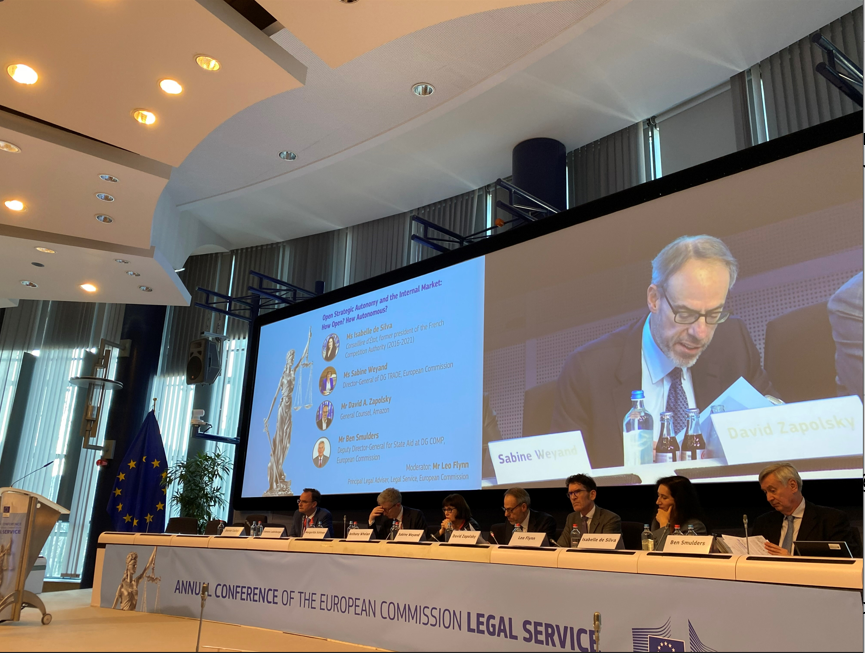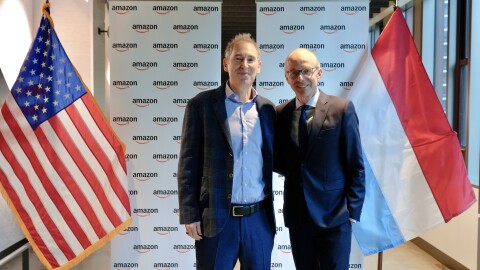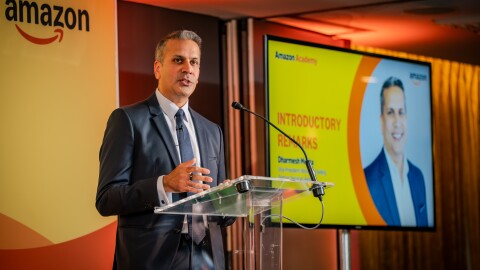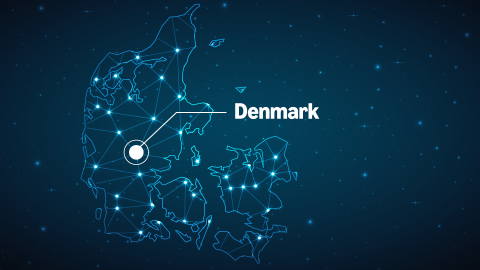Edited remarks from David Zapolsky, General Counsel and Senior Vice President of Global Public Policy, at the Annual Conference of the European Commission Legal Service in Brussels, Belgium.
Amazon in the EU
Amazon has been active in the EU since 1998 when we launched our store in Germany. I joined Amazon shortly after that in 1999. Back then our activities were principally national, with Amazon selling to German customers through our German store.
Even then, we saw potential to build a business on top of a stable European Single Market that would enable us to offer products and services for customers, suppliers, and small businesses across the continent. We have since expanded our stores to eight EU countries, including France, Italy, Spain and, mostly recently for our customers here in Brussels, throughout Belgium. Amazon’s operations are fully integrated into the EU economic system. Over the last 26 years, the world has changed, but we continue to invest in the EU because of the attractiveness of the Single Market.
Our expansion in Europe has increased what our customers across the EU can buy—whether they live in major cities or remote areas. Digital technologies and integrated logistics have also made it possible for small firms from all corners of the EU to sell to customers in Amsterdam, Paris, and Warsaw and also to export to other continents outside Europe, to cities like New York and Tokyo. Amazon helps to make this a reality with our pan-European fulfilment network, our store in many European languages, multilingual customer service staff, our outreach to help SMEs register for VAT everywhere they need to, as well as a wide selection of products and fast delivery. Our Amazon Web Services (AWS) business helps enterprise customers including BBVA, Enel, BMW, Engie, and Philips, build their applications in the cloud and offer their services across the EU and around the world. The AWS cloud also allows public sector customers like the European Commission to lower costs, become more agile, and innovate faster to the benefit of EU citizens.

A sustainable Single Market
Success in designing and building the EU Single Market does not mean that EU policymakers and lawyers can rest. Likewise, it does not mean that a company like ours can rest. There is more to be done to make the Single Market fit for new challenges and stimulate EU competitiveness. For us, there will always be more to do, as customers are permanently discontent – they always want lower prices, faster delivery, more selection and better service, and competition is fierce in segments we know well, such as retail, media, and IT services. The EU is at inflection point. I understand that President von der Leyen has asked former Italian Prime Minister Mario Draghi to prepare a report on improving EU competitiveness and has also asked another former Italian Prime Minister Enrico Letta to make recommendations on deepening the Single Market. This is timely.
Consistent with its democratic foundations, which are shared with the United States, we believe the EU should focus on creating a Sustainable Single Market that makes the EU strong, prosperous, and green. The Single Market creates the momentum necessary to attract capital to accelerate the transition to a sustainable economy. To do this it needs to be open to the world. Legislation in the period 2024-2029 will set the investment framework from now to the mid-2030s – so it’s important to get this right.
When we speak to small businesses using our Amazon Store, they tell us that overly complex bureaucracy prevents them from developing their businesses. They want to reduce cross-border red tape, for example with a single VAT ID in the EU, to allow companies to register for VAT just once. Simplification and legal certainty are also key to enable an innovative and prosperous EU Single Market. A recent study that AWS commissioned shows that one in five European businesses identify compliance and legal uncertainties as a significant barrier to their adoption of digital technology. For businesses that already use multiple AI technologies, nearly half say this uncertainty is preventing them from using technology to its fullest.
Cooperation reinforces EU competitiveness and resilience
Removing barriers and harmonizing rules, policies, and procedures across member states enabled the EU to form an integrated Single Market. This Market functions optimally when easily connecting and conducting business with trusted partners who share similar values and commitment to the rule of law – such as OECD members. These strong ties with allies are critical not only for exporting goods and services beyond Europe and aligning standards, but also for attracting investment to the EU and remaining at the forefront of innovation.
Interoperable policy frameworks that embrace international standards and build cooperation among allies and like-minded countries are fundamental in building trust within and across borders. For example, we know that security and resilience are two of the main benefits of the cloud. Many EU governments and customers in critical industries like health, energy, or transport rely on multi-national cloud providers like AWS to provide the highest level of security and resilience to meet their needs.
Our customers maximize the inherent security and resilience of the cloud. For example, Siemens handles 60,000 cyber threats per second using AWS machine learning. We also empower governments at all levels to safeguard digital assets during disruptions. Shortly after the war began, we worked closely with Ukraine’s government to migrate data and workloads to the cloud securely, preserving vital government services. We supported the migration of over 15 petabytes of critical data for Ukrainian government authorities, universities, and other private sector companies. Using our unique logistics and technology capabilities, we have also helped governments tackle wildfires in Spain and flooding in Southern Europe.
This co-operation—between global businesses and European customers—supports resilience, innovation, and growth on the continent. In that context, we’re concerned about a narrow approach to strategic autonomy, for example, policies that could limit the scope of AWS services in the EU Single Market, simply because our global headquarters, board, and investors are not exclusively European. Such restrictions, which surface occasionally in security policies, risk cutting European businesses and governments off from the most secure cloud services and cyber protections when they are most needed. Likewise, as the EU rightly aims to be globally competitive in AI, limiting customer access to global cloud infrastructure and diverse datasets would inhibit performance and business growth for EU companies. There is an emerging international consensus, for example at the G7, that the best way to enable digital trust and AI development, while protecting citizens, is to ensure that regulation is flexible and international approaches are interoperable. This can be a helpful policy model more generally. I would suggest that well managed cooperation, and a non-discriminatory approach to policy, achieves greater resilience, greater security, and superior economic performance.

Rule of law
Finally, a strong, well-enforced, non-discriminatory EU Single Market, protected by the Court of Justice and European Commission, creates certainty for citizens and investors alike. By strengthening EU competitiveness and society it strengthens EU autonomy. Effective law and regulation should address demonstrable issues, apply fairly and consistently across all EU member states, and ensure citizens and businesses receive the benefits of competition and innovation. Just as in law, non-discrimination is a good principle in policy-making. Jurisdictions that share these fundamental values place high importance on ensuring checks and balances on executive action, with the European courts and Legal Services at the center of that critical function. The need for predictability of the law is even more important for new, untested, and not-yet-interpreted laws. Examples include the GDPR, the Digital Markets Act and soon the AI Act.
The quality of outcomes for citizens and companies is directly proportionate to the quality of dialogue with regulators about how to apply each new law. Some legislation covers many different industries like retail, advertising, app stores, social media, and search, but there are many grey areas and room for interpretation as they’re applied within different companies. That’s why we’ve appreciated opportunities to engage cooperatively with the Commission to forge mutual understanding and agreement about how those laws should apply, and what changes businesses may need to make in order to comply with those new laws. This type of dialog is typically the most efficient approach, though litigation of course plays a role when those dialogues aren’t successful and the parties need a different mechanism to resolve good-faith differences.
Finally, we would welcome additional oversight by the EU courts in merger control. Without an effective means to appeal before the shelf life of deals runs out, fewer cases are tested and the rule of law is under-developed. This introduces uncertainty for investors, particularly where we see the Commission shifting its priorities to block deals that would have been cleared not long ago. Aside from this, there are positive effects that M&A activity can bring. In 2014, Amazon acquired Ivona Software, a small but leading text-to-speech technology developer based in Gdańsk. After years of collaboration and investment, Ivona’s tech ultimately became the voice of Alexa, our voice assistant. What was a small company based on the Baltic coast now has its technology integrated into products sold all around the world, including Alexa, Echo, Kindle, Fire TV and Ring.
So to conclude, I think we all share the same goal of developing a sustainable Single Market that will make the EU strong, prosperous, and green. And as a proud resident of Europe for the past 25 years, we look forward to working with you all toward that goal.










